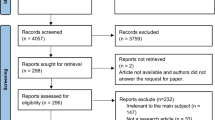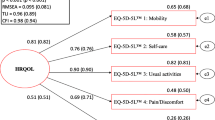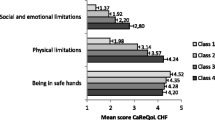Abstract
To systematically evaluate available health-related quality of life (HRQL) instruments for use in patients with heart failure (HF). Seven HF-specific HRQL questionnaires and associated studies of their metric properties were identified by systematic review: the Chronic Heart Failure Assessment Tool, the Cardiac Health Profile congestive heart failure, the Chronic Heart Failure Questionnaire (CHFQ), the Kansas City Cardiomyopathy Questionnaire (KCCQ), the Left Ventricular Disease Questionnaire (LVDQ), the Minnesota Living with Heart Failure Questionnaire (MLHFQ), and the Quality of Life in Severe Heart Failure Questionnaire. Each instrument was assessed by four experts using a standardized tool for evaluating patient-reported outcomes (EMPRO; scores from 0 to 100). Four questionnaires were given adequate scores (median >50) for the attribute “conceptual model.” The LVDQ had the highest rated median for “reliability” (72.8). The CHFQ, the KCCQ, and the MLHFQ all got reasonable scores for “validity” (from 54.4 to 76.4). The reviewers rated the KCCQ the highest in terms of “sensitivity to change” (median 94.4). Only the CHFQ (50.0) and the KCCQ (72.2) received adequate scores for the “interpretability” attribute. The most highly rated instruments based on the overall EMPRO score were the KCCQ (64.4) and the MLHFQ (60.7), followed by the CHFQ (59.2). Based on the first systematic and reliable expert-based evaluation of available HF-specific HRQL questionnaires, the evidence seems to support the choice of the KCCQ, the MLHFQ, and the CHFQ over the others, which require further research on metric properties.
Similar content being viewed by others
References
Lewis EF (2012) Still at the drawing board: improving quality of life in heart failure. Circ Heart Fail 5(2):137–139
Zuluaga MC, Guallar-Castillon P, Lopez-Garcia E, Banegas JR, Conde-Herrera M, Olcoz-Chiva M, Rodriguez-Pascual C, Rodriguez-Artalejo F (2010) Generic and disease-specific quality of life as a predictor of long-term mortality in heart failure. Eur J Heart Fail 12(12):1372–1378
Iqbal J, Francis L, Reid J, Murray S, Denvir M (2010) Quality of life in patients with chronic heart failure and their carers: a 3-year follow-up study assessing hospitalization and mortality. Eur J Heart Fail 12(9):1002–1008
Sullivan MD, Levy WC, Russo JE, Crane B, Spertus JA (2007) Summary health status measures in advanced heart failure: relationship to clinical variables and outcome. J Card Fail 13(7):560–568
Black N (2013) Patient reported outcome measures could help transform healthcare. BMJ 346:f167
Rumsfeld JS, Alexander KP, Goff DC Jr, Graham MM, Ho PM, Masoudi FA, Moser DK, Roger VL, Slaughter MS, Smolderen KG, Spertus JA, Sullivan MD, Treat-Jacobson D, Zerwic JJ; on behalf of the American Heart Association Council on Quality of Care and Outcomes Research, Council on Cardiovascular and Stroke Nursing, Council on Epidemiology and Prevention, Council on Peripheral Vascular Disease, and Stroke Council (2013) Cardiovascular health: the importance of measuring patient-reported health status: a scientific statement from the American Heart Association. Circulation. doi:10.1161/CIR.0b013e3182949a2e
Naveiro-Rilo JC, Diez-Juarez MA, Flores-Zurutuza L, Rodriguez-Garcia MA, Rebollo-Gutierrez F, Romero BA (2012) Quality of life in patients with heart failure: the perspective of primary health care. Gac Sanit 26(5):436–443
Wiebe S, Guyatt G, Weaver B, Matijevic S, Sidwell C (2003) Comparative responsiveness of generic and specific quality-of-life instruments. J Clin Epidemiol 56(1):52–60
Garin O, Ferrer M, Pont A, Rue M, Kotzeva A, Wiklund I, Van GE, Alonso J (2009) Disease-specific health-related quality of life questionnaires for heart failure: a systematic review with meta-analyses. Qual Life Res 18(1):71–85
Scientific Advisory Committee of the Medical Outcomes Trust (2002) Assessing health status and quality-of-life instruments: attributes and review criteria. Qual Life Res 11(3):193–205
Valderas JM, Ferrer M, Mendivil J, Garin O, Rajmil L, Herdman M, Alonso J (2008) Development of EMPRO: a tool for the standardized assessment of patient-reported outcome measures. Value Health 11(4):700–708
Shrout PE, Fleiss JL (1979) Intraclass correlations: uses in assessing rater reliability. Psychol Bull 86(2):420–428
Dunderdale K, Thompson DR, Beer SF, Furze G, Miles JN (2008) Development and validation of a patient-centered health-related quality-of-life measure: the chronic heart failure assessment tool. J Cardiovasc Nurs 23(4):364–370
Mannheimer B, Andersson B, Carlsson L, Wahrborg P (2007) The validation of a new quality of life questionnaire for patients with congestive heart failure-an extension of the cardiac health profile. Scand Cardiovasc J 41(4):235–241
Guyatt GH, Nogradi S, Halcrow S, Singer J, Sullivan MJ, Fallen EL (1989) Development and testing of a new measure of health status for clinical trials in heart failure. J Gen Intern Med 4(2):101–107
Green CP, Porter CB, Bresnahan DR, Spertus JA (2000) Development and evaluation of the Kansas City Cardiomyopathy Questionnaire: a new health status measure for heart failure. J Am Coll Cardiol 35(5):1245–1255
O’Leary CJ, Jones PW (2000) The left ventricular dysfunction questionnaire (LVD-36): reliability, validity, and responsiveness. Heart 83(6):634–640
Rector TS, Kubo SH, Cohn JN (1987) Patients’ self-assessment of their congestive heart failure. Part 2: content, reliability and validity of a new measure, The Minnesota Living with Heart Failure Questionnaire. Heart Failure Oct/Nov:198–209
Wiklund I, Lindvall K, Swedberg K, Zupkis RV (1987) Self-assessment of quality of life in severe heart failure. An instrument for clinical use. Scand J Psychol 28(3):220–225
Zanolla L, Zardini P (2003) Selection of endpoints for heart failure clinical trials. Eur J Heart Fail 5(6):717–723
Heo S, Moser DK, Riegel B, Hall LA, Christman N (2005) Testing the psychometric properties of the Minnesota Living with Heart Failure questionnaire. Nurs Res 54(4):265–272
Middel B, Bouma J, de Jongste M, van Sonderen E, Niemeijer MG, Crijns H, van den HW (2001) Psychometric properties of the Minnesota Living with Heart Failure Questionnaire (MLHF-Q). Clin Rehabil 15(5):489–500
Dijkers MP (2003) Individualization in quality of life measurement: instruments and approaches. Arch Phys Med Rehabil 84(4 Suppl 2):S3–14
Mokkink LB, Terwee CB, Patrick DL, Alonso J, Stratford PW, Knol DL, Bouter LM, de Vet HC (2010) The COSMIN checklist for assessing the methodological quality of studies on measurement properties of health status measurement instruments: an international Delphi study. Qual Life Res 19(4):539–549
Acknowledgments
We would especially like to thank Dave McFarlane for his assistance in managing our initial databases, and Àngels Pont and Áurea Martín-Morris for their help in editing the last draft of this manuscript. This work was supported by a Grant from the Instituto de Salud Carlos III FEDER, (PI06/90483) and Recercaixa (2010ACUP 00158).
Conflict of interest
O.Garin, M.Herdman, G.Vilagut, M.Ferrer, A.Ribera, L.Rajmil, JM.Valderas, F.Guillemin, D.Revicki, J.Alonso, and all other members from the EMPRO-HF Group have no conflicts of interest or financial ties to disclose.
Author information
Authors and Affiliations
Corresponding author
Additional information
The study was conducted on behalf of the EMPRO-HF Group.
EMPRO-HF Group: Allá F, Arnould B, Becerra V, Barblaglia G, Castellví P, Clayson D, Erhart M, Fairclough D, Fleck M, Garcia-Forero C, Gonçalves DC, Gotay C, las Hayas C, Lloyd A, Mathias S, Permanyer-Miralda G, Pont A, Prieto L, Ravens-Sieberer U, Schmidt S, Villalonga-Olives E.
Electronic supplementary material
Below is the link to the electronic supplementary material.
Rights and permissions
About this article
Cite this article
Garin, O., Herdman, M., Vilagut, G. et al. Assessing health-related quality of life in patients with heart failure: a systematic, standardized comparison of available measures. Heart Fail Rev 19, 359–367 (2014). https://doi.org/10.1007/s10741-013-9394-7
Published:
Issue Date:
DOI: https://doi.org/10.1007/s10741-013-9394-7




